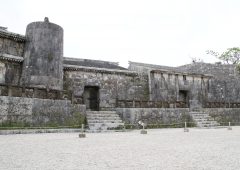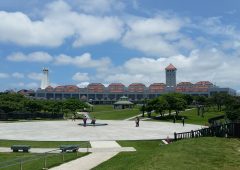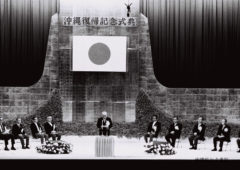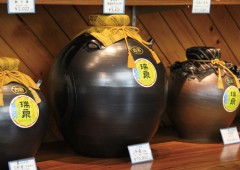2013.07.25
Ruling bloc takes control of Upper House
Japan’s ruling Liberal Democratic Party achieved a big win in the House of Councilors election Sunday, helping end years of divided parliament that has kept the country’s politics unstable.
The LDP and its junior coalition partner New Komeito obtained 76 seats together. Combined with their 59 seats not contested this time, the pair’s strength exceeded 129 seats, the minimum required for a stable majority in the 242-member Upper House. A stable majority is a situation in which the ruling camp holds the chair and a majority of all standing committees in the Upper House.
By contrast, the major opposition Democratic Party of Japan garnered only 17 seats, the worst Upper House election performance since the party’s foundation in 1998. Sunday’s election results marked an end to the divided parliament that has continued almost without a break since 2007, when the LDP, also then led by current Prime Minister Shinzo Abe, lost the Upper House election. The LDP-New Komeito pair holds a comfortable majority in the House of Representatives.
The election was Abe’s first national test since taking office in December and was viewed as a referendum on his radical deflation-busting strategy dubbed “Abenomics.”
“I believe (voters) told us they want stable politics so decisions can be made and economic policies promoted,” Abe said on TV.
Asked what issues he will prioritize from now, Abe said he will put the economy first.
“We’d like to implement economic policies that will create tangible results” for the public, he said. Abe said the election results show the public’s strong support for his economic policy, called Abenomics. “I will make progress in politics in a responsible manner,” he added. Abe expressed his determination to speed up efforts to end deflation in Japan by using his grip over power that has been strengthened thanks to his party’s election victory. The focus is on whether Abe will carry out a cabinet shakeup or replace any of the LDP executives whose term of office ends in late September. Whether to raise the consumption tax to 8% from the current 5% in April 2014 as scheduled is also a key issue.
In the Upper House election, 121 seats were contested, including 73 for the 47 prefectural constituencies and 48 for nationwide proportional representation. The LDP achieved victory in 29 out of the 31 prefectural constituencies where one seat each was contested. The two exceptions were Iwate and Okinawa. In Okinawa, Keiko Itokazu, a regional party leader strongly opposed to the planned relocation of the Futenma Marine Corps Air Station, was elected to a third term in the election.
The 65-year-old Itokazu, head of the Okinawa Social Mass Party, beat 45-year-old Masaaki Asato of the Liberal Democratic Party for the only seat being challenged in the Okinawa Prefecture constitutency. A Yomitan native and member of the Church of Jesus Christ of Latter-Day Saints, Itokazu ran unsuccessfully for governor in 2006 after serving three terms in the Okinawa Prefectural Assembly. She was elected to the House of Councilors in 2007.
Itokazu’s victory lent credence to the argument Okinawans are still strongly opposed to the Futenma relocation. “Public opposition to the relocation to Henoko and the deployment of Osprey vertical takeoff and landing aircraft to Futenma was clearly shown to the Abe administration and the U.S. government,” Itokazu told her supporters. “Everything the Abe government is doing is unacceptable to prefecture residents, whose clear will brought me votes.”
The party saw all its candidates obtain seats in the remaining 16 prefectural constituencies in which two to five seats were up for grabs. In the proportional representation bloc, the party secured 18 seats. As a result, the LDP won a total of 65 seats in the latest poll, topping 60 for the first time in 12 years and achieving the highest number under the current Upper House election system. The result represented a sharp increase from the 34 seats that it previously had and were contested this time.
New Komeito obtained a seat in each of all four prefectural constituencies where it fielded candidates. An additional seven seats were acquired through proportional representation. The DPJ shed more than half of its 44 seats contested in Sunday’s election and the number of seats it won this time was short of the 26 registered in 2001, the previous record low. The DPJ was defeated in all of the 19 single-seat prefectural constituencies for which the party set up candidates.
Among key DPJ candidates, Upper House Budget Committee Chairman Hajime Ishii and former Defense Minister Yasuo Ichikawa lost their seats. Nippon Ishin No Kai, the Japan Restoration Party, secured eight seats including one from Okinawa when former Urasoe Mayor Mitsue Gima garnered a seat through proportional votes, boosting its Upper House strength to nine from three, but the party lacked the vigor seen in the latest Lower House election last December. Your Party garnered eight seats, falling short of its previous Upper House election result of 10 seats.
The Japanese Communist Party won a seat in each of the Tokyo, Kyoto and Osaka constituencies, achieving presence in multiple constituencies for the first time since 1998. The party also obtained five seats through proportional representation. The Social Democratic Party won only one seat, its worst performance on record. The People’s Life Party, led by veteran lawmaker Ichiro Ozawa, and Green Wind failed to obtain any seats.
Major candidates who acquired Upper House seats included the LDP’s Miki Watanabe, former chairman of restaurant chain Watami Corp., independent Taro Yamamoto, a TV personality who is also an activist against nuclear energy, and Nippon Ishin’s Antonio Inoki, former professional wrestler. Voter turnout stood at 52.61%, down 5.31 percentage points from the previous poll in 2010 and the third-lowest on record, according to estimates by Jiji Press.

 2024.07.07
2024.07.07 2024.06.21
2024.06.21 2024.05.15
2024.05.15 2024.02.07
2024.02.07 2024.01.31
2024.01.31 2023.11.02
2023.11.02 2023.10.26
2023.10.26 2023.09.29
2023.09.29 2023.09.01
2023.09.01






